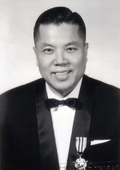Maestro WuPakChiu

Wu Pak Chiu (Pinyin: wǔ bó jiù; Yale Cantonese: ng5 ba3 jau6) (ca. 1913 – March 31, 1974), was a prominent Chinese tenor who sang in Europe under the name of Gregorio Wu Pak Chiu.
Wu Pak Chiu was born in Guangzhou, China, and graduated from the Shanghai Conservatory of Music in 1937 where he studied voice under Professor Lu Cha Zhi. During the Sino-Japanese War he earned fame for his singing of the anthem 'Defend China' by Ho An-Tung.
In December 1946, he left China and enrolled as a fourth year student at the Accademia di Santa Cecilia in Rome and graduated in 1948 at the top of his class. During that period he also studied as a private student with Beniamino Gigli. In 1952 he sang in concert with Gigli and his daughter Rina Gigli at Sezze Romano. Gigli also attended Wu Pak Chiu's solo concert in Rome at the Sala Borromini on June 29, 1955.
Following his performance as the tenor soloist in Bartok's Cantata profana at the Teatro Argentina in Rome in 1954, he was invited to sing in Italy, Spain, France, Germany, Portugal, Switzerland, and England both in concert halls and on radio and television, where he often included Chinese songs in his repertoire.
In 1969, he returned to Hong Kong where he gave his final performance in a recital for the Lingnan University Alumni Association. Following his retirement from the concert stage, he taught vocal and choral singing at several secondary schools in the city and directed a production of Puccini's Turandot. He died in Hong Kong...more
Was the pupil of the world famous vocalist Professor Lu Cha Zhi.
In December 1946, he went to Italy and was in the Rome Conservatory of Santa Cecilia
as a 4th year student;
In November 1947, he sang and was heard by Beniamino Gigli;
Graduated from Rome Conservatory of Santa Cecilia in 1948;
After Gigli heard him sing, he said he had discovered a diamond in a black coal mine;
Immediately, he invited him to his house and asked his daughter
to play the piano to accompany his singing;
Gigli never had private students but made an exception in his case and
asked him to be a private pupil and godson;
He commented that "this young tenor not only was his best pupil, he was also his godson.
He not only had a natural, lovely voice but he was also intelligent and worked hard.
His future was unlimited"
----
Three important events:
1.1952, Sezze Romano, he sang with Gigli and Gigli's daughter before the President of Italy and more than 50 ambassadors;
At the end of the concert, Gigli said to him "You have sung all my songs, I have no more songs to sing";
( 1953, the Spanish government invited him to Madrid and the largest newspaper "ABC" reported and commented "he is a Chinese treasure";
In the same year, he was invited to Paris and also he undertook some recordings.)
2.On November 19, 1953 more than 50 tenors competed at the Conservatory Saint Cecilia to have the honour of singing in the opening performance of the 21st Century Music Performances.
3.In April 4, 1954, in Rome in the Argentine Theatre, the 21 st Century Music Performances, Professor Wu had won the competition to be the first tenor to open the Conference and sang Bela Bartok "Cantata Priana".
At that time, there were music critics, composers, and musicians from 25 countries. There was a 300 person orchestra. There were 12 days of performances. This was organized by Geneva European Cultural Centre. More than 20 countries were represented by the best musicians and they formed the Advisory Group and Igor Stravinsky was the Chief Advisor.
Maestro Wu was then invited to sing and tour in Italy, Spain, France, Germany, Portugal, Switzerland, and England.
In 1966, he returned to Taiwan and Hong Kong.
Maestro Wu Pak Chiu passed at the age of 61 on March 31, 1974